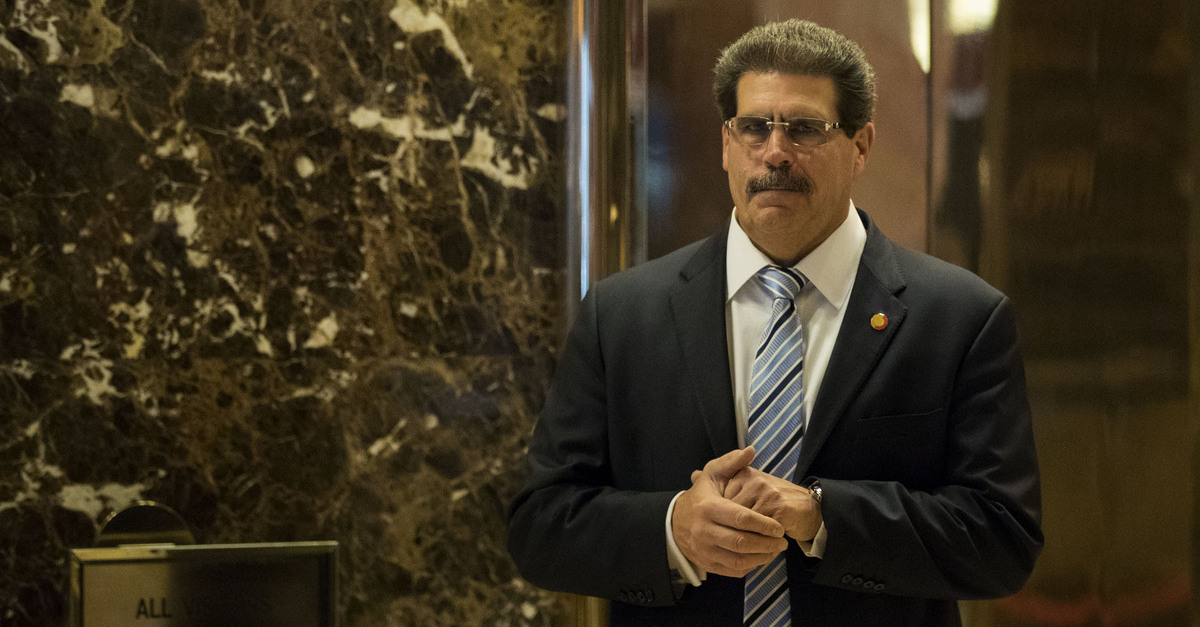
Matthew Calamari stands in the lobby of the Trump Building on Fifth Avenue in Manhattan, NY.
Former President Donald Trump’s onetime bodyguard, who now serves as a key manager with the Trump family business, is reportedly being investigated by Manhattan prosecutors.
According to the Wall Street Journal, Trump Organization executive Matthew Calamari is being scrutinized by the New York City District Attorney’s Office as part of their wide-ranging probe into whether the company and/or executives there committed fraud. Here, the apparent focus is on whether the Trump Organization and top brass skirted tax laws by providing employees with fringe benefits that were never accounted for in tax filings.
Prosecutors’ interest in Calamari can be likened to their interest in the Trump Organization’s Chief Financial Officer Allen Weisselberg, who has reportedly been targeted in an effort to flip him as part of the broader inquiry into allegations that Trump’s family overvalued and undervalued certain assets in order to receive undue rebates or benefits.
No charges have been filed against Weisselberg or Calamari, but the former was subpoenaed in late March of this year. The office led by Cyrus Vance, Jr. has convened a grand jury in late May, which will be convened for a reported term of six months.
From the WSJ‘s report by Rebecca Ballhaus and Corinne Ramey:
Prosecutors in recent weeks advised Mr. Calamari and his son, Matthew Calamari Jr., that they should hire their own lawyer, people familiar with the matter said. The elder Mr. Calamari, who works as the Trump Organization’s chief operating officer, and his son, the company’s corporate director of security, had previously been represented by a lawyer who was also representing other Trump Organization employees, one of the people said.
Such a recommendation is often a sign that prosecutors’ interest in a subject is intensifying, but doesn’t mean the Calamaris will be charged with wrongdoing.
The Calamaris have hired Nicholas Gravante Jr., head of commercial litigation at Cadwalader, Wickersham & Taft LLP, some of the people said.
Calamari, a stalwart of the Trump family, briefly served on the 45th president’s 2016 presidential campaign and was paid just over $4,000 in July of that year, according to records collected by the Federal Election Commission. He began working as Trump’s bodyguard in 1981 and eventually impressed his boss so much that Trump praised him in a 2004 financial self-help book/memoir: “Trump: How to Get Rich.”
The COO’s potential role in the subject of the fraud probe became a matter of public knowledge–and prosecutorial interest–last summer after congressional testimony provided by Trump’s former lawyer, friend and fixer Michael Cohen.
Rep. Alexandria Ocasio-Cortez (D-NY) put arrows in at least two prosecutors’ quivers by asking Cohen directly whether he knew if Trump “ever provide[d] inflated assets to an insurance company.”
“Yes,” Cohen answered.
“Who else knows that the president did this?” the Bronx-based democratic socialist inquired.
Cohen then went on to implicate Calamari, Weisselberg and executive Ron Lieberman.
That brief back-and-forth quickly led both Vance’s office and New York State Attorney General Letitia James (D) to open or widen preexisting investigations into Trump’s family, Eric Trump in particular, and the business which bears their name.
“If he’s inflating his assets to get a better insurance rate or whatever, he’s using a scheme or artifice–which is the language of the statute–that’s arguably using a scheme or artifice to defraud the insurance company,” computer law expert and criminal defense attorney Tor Ekeland told Law&Crime at the time.
“The important thing to note about the wire fraud and the bank fraud statutes is they’re extremely broad and you don’t actually have to have succeeded in committing the fraud you were trying to initiate,” Ekeland elaborated. “The second you’re communicating in interstate commerce–with a telephone or email, the wires–they’ve got you.”
[image via Drew Angerer/Getty Images]